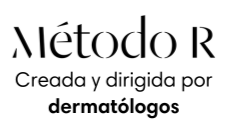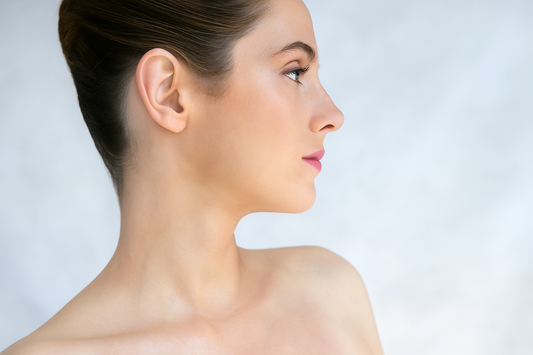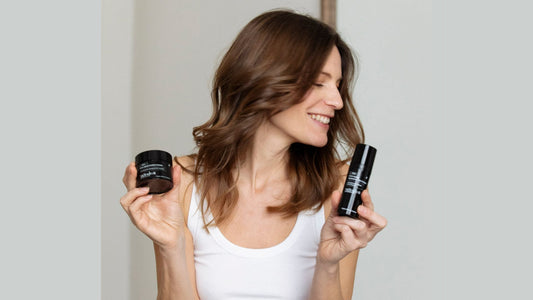Searching for a perfect skin care routine can seem challenging amid the overwhelming number of options on the market. From serums, toners, lotions and creams to cleansers, double cleanses and exfoliants, the variety of products may leave you wondering: Which one is right for my skin type? Will I be doing it right?
In this article, we'll explore how to simplify and personalize your skin care routine to achieve the healthiest version of your skin.
1. Understand your Skin Type
It is true that there are as many skin types as there are people in the world but, as with food, we all need the same vitamins and ingredients. The only thing that changes are the textures and tolerance. Before you dive into the vast ocean of skincare options, it's crucial to understand the condition of your skin. I'm talking about the state of your skin and not the type of skin because it can change throughout life for various reasons. Right now, is your skin oily, dry, combination or sensitive?
How to determine the condition of your skin?
- Oily Skin : They tend to have larger pores and produce more sebum. Look for non-comedogenic and not very oily products to keep your skin balanced. Retinoids (vitamin A), niacinamide, hydration, and exfoliants also help balance sebum production in the skin.
- Dry Skin : Needs intense hydration. Opt for products rich in moisturizing ingredients such as hyaluronic acid and panthenol.
- Combination Skin : This is usually oily, dehydrated skin. Look for products designed to increase hydration and control excess oil.
- Sensitive or Sensitized Skin : Reacts easily to a large number of ingredients and fragrances. Choose gentle, fragrance-free products designed for sensitive skin and with very few ingredients.
Method R makes it easy for you, with its unique approach: cosmetic routines designed to improve skin health and prevent aging. Our proposal is not limited to individual products, but is based on the combination of products. This combination, backed by the extensive experience of the dermatologists who have developed our brand, and published in the most important international scientific journal, the JCD, offers the best cosmetic results.
2. Read Product Labels
Skin care product labels are like maps that guide you to the treasure of healthy skin. Indicating the active ingredients of cosmetics and their concentrations is a sign of transparency.
If you have sensitive or sensitized skin, pay attention to key ingredients, look for those that have been shown to be effective as skin barrier protectors, and avoid those that may trigger irritation or allergic reactions. Insist a lot on hydration, do not trust natural products because they are often more irritating and look for cosmetics with very few ingredients.
3. Without routine there are no results. Establish a Basic Routine
A basic skin care routine typically includes cleansing, moisturizing, and photoprotection. To choose the right products, consider your skin's specific needs.
- Cleansers : Regardless of your skin type, opt for gentle, hydrating cleansers. Don't miss the opportunity to take advantage of this step to insist on hydration. And when we talk about hydration, we are referring to hydrating active ingredients such as hyaluronic acid and panthenol.
- Moisturizers : Hydration is key, even for oily skin. Use light formulas for oily skin and richer creams for dry skin but insist on hydration because it is one of the most important steps for skin health. Make sure it is present in all steps of the routine.
- Photoprotection . We emphasize the importance of photoprotection, always with common sense. In winter, if you are not going to be exposed to the sun, in our opinion, it is not necessary. In summer, or when you go skiing or do outdoor sports, protect yourself as much as possible with physical sunscreens, also known as minerals.
4. Introduce Specific Products According to Your Needs
Once your basic routine is established, you can incorporate specific products to address additional concerns. This could include serums with anti-aging active ingredients, acne treatments or eye contour products.
- Serum : Choose ingredients such as vitamin C, ferulic acid and niacinamide to combat signs of aging or more specific active ingredients to treat skin conditions, as recommended by your dermatologist. Try to make your serum complete and include everything your skin needs, in a single product.
- Yeah you have sensitive skin, sensitized or simply want to keep your skin healthy, look for moisturizing and repairing active ingredients for the skin barrier.
- And to prevent and improve signs of aging , active ingredients such as retinoids, kojic acid, hyaluronic acid, niacinamide, peptides and exfoliants.
5. Start with Caution
Choose well the ideal time to change your skin care routine. If you are introducing active ingredients for the first time, make sure your skin is healthy and well hydrated. If you have doubts, do a hydration treatment, using a very moisturizing cream in the morning and at night for 2 weeks before starting. Avoid starting before a ski or summer vacation because if you sunbathe with irritated skin, you may get spots.
6. Consult a Skin Professional
It's always helpful to consult a dermatologist or skin professional for personalized guidance. They can help you identify specific problems and recommend products tailored to your needs.
In short, choosing the right skin care products for your skin involves understanding your specific current needs, reading product labels carefully, establishing a basic routine, and starting with caution. Being consistent with your skin care routine will allow you to achieve radiant, healthy skin that reflects the love you give it.
Your skin is unique. Take care of her, pamper her, thank her.




